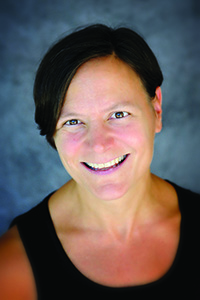WSU Economists Find Generosity on Behalf of Others
OGDEN, Utah – When planning for the future, individuals are more willing to save to benefit others than to benefit themselves, according to two Weber State University economic faculty Therese Grijalva and Matt Gnagey.
“This is an important finding because, inevitably, in the distant future, we will not be around, so any long-term policies should emphasize our preferences for others,” Gnagey said.
 Their paper, “The less you discount, the more it shows you really care”: Interpersonal discounting in households,” was published in the Journal of Economic Behavior & Organization. It was co-authored with economics professor Rong Rong from the University of Massachusetts Amherst.
Their paper, “The less you discount, the more it shows you really care”: Interpersonal discounting in households,” was published in the Journal of Economic Behavior & Organization. It was co-authored with economics professor Rong Rong from the University of Massachusetts Amherst.
“In an economic experiment, participants come into a lab,” Grijalva explained. “They make economic decisions and then walk out of the lab with cash in hand based on the decisions they made. Economists use real incentives to get real behavior.”
For their experiment, the John B. Goddard School of Business & Economics faculty tested interpersonal discounting or the Interpersonal Discount Rate (IPDR). In one such form, the IPDR is the rate at which individuals value the future, in other words, the decisions or tradeoffs they make now in order to maintain or improve standards for future generations. Climate change is one area that has sparked a great deal of discussion about the discount rate.
“We’re going to have to give up some consumption of goods and services today to mitigate climate change for the benefit of the future,” Grijalva said. “We want to make sure these benefits are greater than these costs, but we have to bring them back to today’s dollar value, so that rate is called the discount rate.”
 With 188 participants, what the WSU researchers found was that individuals were willing to give up consumption today in order to protect and provide resources for members of their household, specifically their spouse or partner, in the future.
With 188 participants, what the WSU researchers found was that individuals were willing to give up consumption today in order to protect and provide resources for members of their household, specifically their spouse or partner, in the future.
“Evidence suggests that people do care about the welfare of the future,” Grijalva said. “They would give up something today for the well-being of the future generations, more so than what they would give up for their own personal future.”
Grijalva and Gnagey’s research did not test why people are willing to sacrifice for others, whether its altruism, fairness or equity, but no matter the reason, the results were clear.
“When you make decisions for the future, you make those decisions differently for yourself than when you are making them for someone else,” Gnagey said. “There is something uniquely different about how we think about other people's futures versus our own future.”
Research findings often prompt additional research questions, and this time is no exception. Gnagey and Grijalva would like to explore how much individuals would be willing to give up to benefit a stranger versus a spouse or how much an individual is willing to sacrifice on behalf of a group. But the research left no doubt that when it comes to the future: individuals worry more about others than they do about themselves.
To read the entire publication, visit this link.
For photos, visit the following links.
Visit weber.edu/wsutoday for more news about Weber State University.
Allison Barlow Hess, Public Relations director
801-626-7948 • ahess@weber.edu- Contact:
Allison Barlow Hess, Public Relations director
801-626-7948 • ahess@weber.edu
